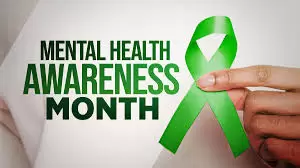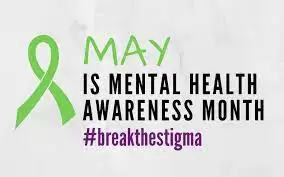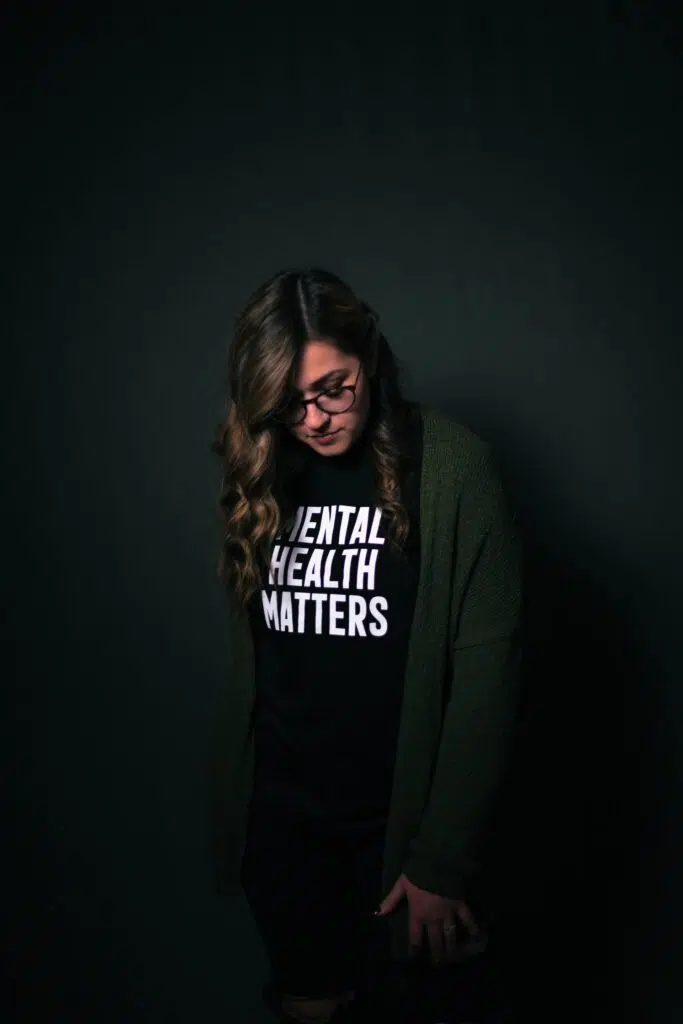
Table of Contents
ToggleIntroduction
Mental Health Awareness Month has been observed in the U.S. since 1949. In May, NAMI joined the national movement to raise awareness about mental health. It’s important to understand that we fight against stigma, help and support others, teach people, and speak up for policies that help millions of people in the U.S. who are affected by mental illness.
Green Commemorates The Start of "Mental Health Month"
Over one hundred sites across the country will be illuminated in green to commemorate the start of Mental Health Awareness Month in May. Mental Health Awareness Month 2023’s theme is “More Than Enough.”
We want everyone to realize that simply waking up today is more than enough. Regardless of what happens, you naturally deserve more than enough life, love, and healing. Just taking time for yourself and those around you is more than enough.


What Can I Do To Take Care Of My Mental Health This Month?
Taking care of your mental health is crucial to your well-being. Dedicating time and effort to it is a valuable investment. Each month presents an opportunity to focus on your mental health. This month is unique because “May is Mental Health Awareness Month.” Let’s explore some specific actions you can take to enhance your well-being this month. Here are some practical steps to nurture your mental health this month.
Prioritize Self-Care
1. Self-care is the foundation of good mental health. Make a conscious effort to prioritize activities that bring you joy and relaxation. Engage in hobbies, practice mindfulness or meditation, take a warm bath, or indulge in a good book. Allocate dedicated time for self-care activities and ensure they become integral to your daily routine.
Establish Healthy Boundaries
2. Setting boundaries is crucial for maintaining a healthy mental state. Learn to say no when necessary and avoid overcommitting yourself. Understand your limits and respect your personal space and time. This will help reduce stress, prevent burnout, and create a balance.

Connect With Others
3. Human connection is vital for our mental health. Contact friends, family, or support groups to foster meaningful relationships. Open and honest conversations can provide a sense of belonging, support, and validation. Connect with others and nurture your social connections in person or virtually.
Practice Mindfulness and Meditation
4. Mindfulness and meditation are powerful practices that can help reduce stress and promote mental well-being. Set aside time each day to engage in mindfulness exercises, such as deep breathing, meditation, or simply being fully present at the moment. These practices can help calm the mind, increase self-awareness, and improve overall mental clarity
Engage In Regular Physical Exercise
5. Physical activity has been linked to improved mental health. Incorporate regular exercise into your routine, whether walking, jogging, dancing, or attending a fitness class. Exercise releases endorphins, which are natural mood boosters and can help alleviate symptoms of anxiety and depression.
Nourish Your Body with Healthy Food
6. A nutritious diet not only benefits your physical health but also positively impacts your mental well-being. Consume a balanced diet rich in fruits, vegetables, whole grains, lean proteins, and healthy fats. Avoid excessive caffeine and sugary foods, which can negatively affect mood and energy levels.

Practice Gratitude
7. Cultivating a mindset of gratitude can significantly improve your mental health. Take a moment each day to reflect on what you are grateful for. It could be simple things like a warm cup of tea, a beautiful sunset, or the support of loved ones. Expressing gratitude helps shift your focus to the positive aspects of life and fosters a sense of contentment.
Disconnect from Technology
8. In today’s digital age, taking breaks from technology is vital to protect your mental health. Set boundaries around your screen time, especially before bed, to ensure quality sleep. Engage in activities that don’t involve screens, such as reading a book, going for a walk in nature, or practicing a creative hobby.
Seek Professional Help If Needed
9. If you struggle with your mental health, don’t hesitate to seek professional help. Contact a therapist, counselor, or psychologist who can provide guidance, support, and personalized strategies for managing your mental well-being. Remember, seeking help is a sign of strength, and resources are available to support you.

Educate Yourself
10. Take the initiative to educate yourself about mental health topics. Learn about different conditions, signs, and symptoms to increase understanding and empathy. Understanding mental health and how it affects people can help us be kinder and more supportive of others. When we know the facts, we can break down the walls of stigma and create a world where everyone feels safe and cared for.
Conclusion
Taking care of your mental health is a continuous journey that requires conscious effort and self-awareness. This month, commit to prioritizing your mental well-being by implementing these practical steps into your daily life. Remember that self-care, healthy boundaries, human connection, mindfulness, exercise, proper nutrition, gratitude, and disconnecting from technology are all essential to maintaining good mental health.
By investing time and energy in your mental well-being, you are benefiting yourself and creating a ripple effect of positivity in your relationships, work, and overall quality of life. Mental Health Month serves as a reminder to prioritize our mental health and to break the stigma surrounding mental health issues. Embrace this opportunity to prioritize self-care and take positive steps toward nurturing your mental well-being this month and beyond.
Frequently Asked Questions
- What if I don’t have much time to dedicate to self-care?
Even if you have a busy schedule, it’s important to carve out even small moments for self-care. It can be as simple as taking a few deep breaths, listening to calming music during your commute, or practicing mindfulness while doing daily tasks. Every little effort counts, so find small pockets of time throughout your day to prioritize your mental well-being.
- How can I foster human connection if I can’t meet people in person?
While physical interaction is beneficial, virtual connections can also be meaningful. Utilize technology to stay connected with loved ones through video calls, group chats, or online communities. Join virtual support groups or participate in online events centered around your interests. Remember, even virtual connections can provide support and a sense of belonging.
- How do I know when it’s time to seek professional help?
If you are experiencing persistent sadness, anxiety, or struggling to cope with daily life, it may be time to seek professional help. Other signs include a significant change in sleep or appetite patterns, difficulty concentrating, loss of interest in activities, or thoughts of self-harm. Trust your instincts and reach out to a mental health professional who can provide guidance and support tailored to your needs.
- Can I practice self-care and prioritize my mental health beyond Mental Health Month?
Absolutely! Mental Health Month is a reminder to prioritize mental health, but taking care of your well-being should be a continuous practice. Incorporate these tips into your daily routine and make them a part of your lifestyle. Remember, self-care and mental health are ongoing commitments that require consistent effort and attention.
Taking care of your mental health is a journey that involves self-compassion, self-reflection, and intentional actions. By implementing these practices, you proactively invest in your well-being and nurture a healthier mind. May this month be a stepping stone towards a happier, more resilient, and mentally thriving you
Mental Health Resources
- National Alliance on Mental Illness (NAMI): www.nami.org NAMI provides information, resources, and support for individuals and families affected by mental health conditions. They offer helplines, educational materials, and advocacy initiatives.
- Substance Abuse and Mental Health Services Administration (SAMHSA): www.samhsa.gov SAMHSA offers a range of mental health and substance abuse resources, including treatment locators, educational materials, and a national helpline.
- MentalHealth.gov: www.mentalhealth.gov MentalHealth.gov provides information about various mental health conditions, treatment options, and resources for seeking help. It also offers guidance on promoting mental health in communities and workplaces.
- Crisis Text Line: Text “HELLO” to 741741. Crisis Text Line provides free, 24/7 support for individuals in crisis. Trained crisis counselors are available to provide assistance and support via text message.
Remember, these resources support you on your mental health journey. Don’t hesitate to reach out if you need help or guidance. You are not alone, and there is support available to you.
About The Author
Zackery Dixon
administrator
Zackery N. Dixon, a seasoned web designer, entrepreneur, blogger, and proud U.S. Marine, has carved a remarkable path in the digital landscape. At 69, Zackery’s extensive experience and dedication have culminated in a fulfilling retirement, underscoring his notable achievements in the industry.
With a career spanning several decades, Zackery’s expertise in web design is reflected in the successful management of four diverse and dynamic websites. Each platform—First Digital Electronics, Law of Attraction Lab, Diet Exercise Pros, and Yoga Meditation Hub—demonstrates his commitment to delivering valuable content and innovative design.
Disclaimer: The information provided on this blog is for informational purposes only and should not be considered as professional advice.
Always seek the advice of a qualified professional with any questions you may have regarding a particular matter.



